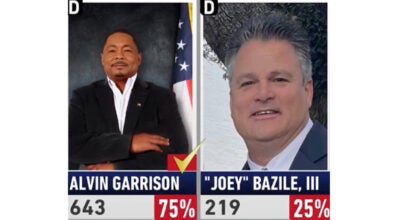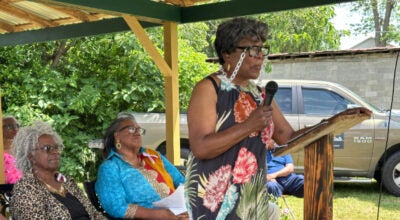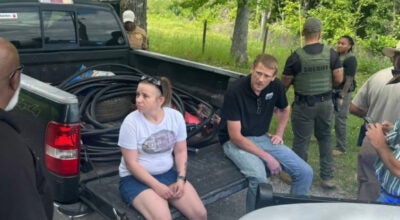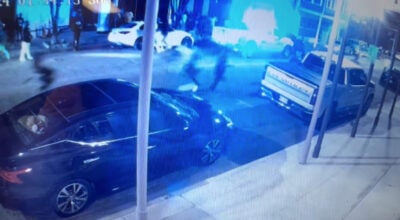Sunday Focus: Officials look for solutions to continue recycling effort
Published 12:05 am Sunday, September 27, 2015

Concordia Metal employees sort through the pile of recyclable materials at the company’s sorting center. After two years, only 1-in-5 of the households that have the recycling option has chosen to do so. The continuing difficulty for the local officials is how to keep the program. (Sam Gause / Natchez Democrat)
By Sarah Cook and Vershal Hogan
Recycling may be about saving the planet, but local officials say the local recycling program needs saving first.
After three years, only 20 percent of those households that have the option are recycling.
With only 1-in-5 of the 7,000 eligible households participating in the effort, the program — endorsed by local governments and spearheaded by a private company, Concordia Metal — is losing money, and the company has said current costs could close the program down at the end of its contract next year.
“I don’t think anybody is making a profit on this program,” said Vidalia Alderman Ricky Knapp, who led the push for recycling in his city.
“We need to figure out a way to make a successful program. It is not just for our area, it is for the world.”
Building a better trash can
Natchez began its curbside-recycling program in June 2013 when it received a $317,162 regional cooperative recycling grant from the Mississippi Department of Environmental Quality.
Waste Pro USA Inc. — a waste removal service company — picks up receptacles from those households each Wednesday.
The materials are then sent to Concordia Metal in Vidalia for sorting.
Once recyclables arrive at Concordia Metal, a team of six to eight employees sort materials by hand. Once sorted, Concordia Metal sells the recyclables to companies that can repurpose them.
The initial recycling grant, and the city’s recycling contract, expires June 2016.
Since the city began its recycling program, approximately 20 percent of the city’s 6,000 households have participated.
The City of Vidalia started a 500-can pilot program in September 2013, with city garbage crews picking the recyclables each Wednesday and taking them to the Concordia Metal site.
Knapp said on average approximately half the containers in the program are used on a weekly basis.
Vidalia has approximately 1,200 residential garbage customers, so only approximately 20 percent of households there are recycling.
The numbers hold true for the areas outside the City of Natchez that Adams County has marked for its own 500-can pilot program since April 2014.
Adams County also offers recycling at its waste disposal convenience stations on Kingston and Foster Mound roads.
Cost versus value?
Concordia Metal Recycling coordinator Jim Smith attributed recycling woes to two factors — increased processing costs and decreased commodity costs.
“The cost of sorting through (the material) far outweighs what the material is worth,” Smith said. “This is a problem that is going on throughout the country.”
Per week, Concordia Metal gets approximately six to seven tons of recyclable material from residents and industries in Natchez and Adams County, Smith said.
The cost to sort each ton, Smith said, is $150 — and the profit yielded from each ton is $90.
“So we’re losing $60 a ton,” he said.
Per month, Smith said the recycling initiative loses approximately $2,000.
“We understood going into this that it would be a bumpy road,” he said. “This is not a money-making endeavor.”
Another big hit to recycling nationwide, Smith said, is decreasing commodity costs — mainly paper products.
“Sixty-five to 75 percent of the volume we get is paper,” said Smith, adding that the cost of paper has been in the lowest it’s been in 20 years.
With society shifting into a digital age, Smith said the need for paper is decreasing, causing the sale of recycled paper to decrease.
“The commodity prices are low, and we think they’re going to stay low,” Smith said. “This is happening nationwide.”
Smith said Concordia Metal also charges no tipping fee — the charge levied upon a given quantity of waste received at a waste processing facility.
Not charging that fee, Smith said, doesn’t help recycling profitability.
“They charge about $80 (for tipping) in the Northeast,” he said.
Adams County pays $18.75 per ton in tipping fees for non-recycling disposal, while Natchez pays approximately $14.
But because Natchez and Adams County is a rural area, Smith said the recycling initiative faces the handicap of receiving less recyclable material compared with larger cities such as Baton Rouge or Jackson.
“If we were getting in 200 tons like Jackson or Baton Rouge, it would help,” Smith said. “But we’re not getting that.”
Population placement also places another hurdle in the way of making a rural program work. The costs and logistics of recycling increase with the distance one has to travel to collect recyclables.
“We don’t have the density the city has, so we have got places where —if it is going to work — we are going to have to have 100 percent participation because of the density between the houses,” Adams County Supervisor Mike Lazarus said. “We are getting some good action at the convenience stations, though.”
Knapp said the Vidalia program gathers approximately a ton of recyclables every week.
The savings on reduced garbage tipping fees are offset because the city has to pay for the extra labor and fuel to make the recycling pickup, he said. Covering the entire city on a recycling run takes approximately four hours.
But although recycling program in the Miss-Lou is currently in a bind, Smith said there are several ways for the program to live past June 2016.
The future
In order for a recycling program to be successful in Natchez and Adams County, Smith said three areas need to be improved — transportation, processing and education.
The MDEQ grant currently covers all transportation costs in Natchez. Once that grant expires, Smith said someone would have to pick up that charge.
If businesses and schools were willing to pay for transportation costs, Smith said a heavy burden would be lifted from the recycling initiative.
Secondly, processing efficiency needs to be improved, Smith said.
Because all recyclable materials are sorted by hand, Smith said the process is labor intensive.
And, more often than not, residents are placing trash items in their recycling bins instead of approved materials — resulting in more work for processers, Smith said.
“We get cat litter, medical drip bags, rubber — basically things that aren’t recyclable,” Smith said.
If people could become better informed on what is recyclable, Smith said, the whole process — and the program — would immensely benefit.
One way that could be done would be through attrition of services.
Knapp said he would like to see the city reduce the total number of garbage runs to encourage people to start separating their recyclables and taking them to the curb each week.
“I would like to see us go to one day a week trash and one day a week recycle,” he said. “That possibly would increase the volume of the recycling, of people seeing that — if they have the two bins — they will take a little more effort to fill up the blue bins.”
The third component that would make recycling more successful — and perhaps the most important, Smith said — is education.
“Teaching has to be ongoing, and it has to change with the time,” Smith said.
Rico Gianni, interim city planner for the City of Natchez, said he has hit the ground running since local schools opened their doors for the school year to educate children on the importance of recycling.
“It’s more important now than ever that people get on board,” said Giani, who has visited seven schools in Natchez since August. “I’m ready to pound some concrete and get this going.”
Giani said his goal is to get a recycling receptacle in every classroom in every school in the Miss-Lou.
“Then, when Tuesday rolls around, you get a student to take all the recyclables they collected for the week and bring it to a centralized location so it can be sent to the curb for Wednesday pickup,” Giani said.
Through making students aware of why recycling is important, Giani said, the Miss-Lou could foster generations of environmentally-conscience community members.
“I think you can teach kids that if you throw a Styrofoam cup on the ground in the middle of the forest it won’t degrade — ever,” Giani said. “It’s that simple”
Giani said it’s easy for teachers to work recycling into their curriculums.
By having students weigh recyclable material each week, and discussing chemical makeup of those materials, Giani said several subjects — such as math and science — are touched.
Lazarus said he believes the recycling movement should continue, even if it costs the area something in the short term.
“It is something I feel like will one day be mandated for most communities, and it’s better to be ahead of that,” he said.
Natchez aldermen have also weighed in on how the recycling program can live past June by creating a task force that solely deals with recycling.
Former city engineer David Gardner, who is on that task force, said the group hasn’t met yet, but he expects it to offer several solutions to the current recycling problem.
Increasing the amount of recyclables sent to processing facilities, Gardner said, is the task force’s first goal.
“We are trying to increase that volume so we can break even or even make it profitable,” he said. “Once you get that scenario going, you make the market for recycling more attractive.”
Giani and Smith said most importantly the community should fight for the future of recycling for one overarching reason.
“It’s our responsibility to be good stewards of the environment,” Giani said.
Smith said if the community could get behind whatever direction the city and county goes in for recycling after June 2016, there’s a good chance recycling could live to see another day.
“Whatever is introduced in June, the public needs to be behind it,” Smith said. “I would like to see every household have a recycling bin.”





